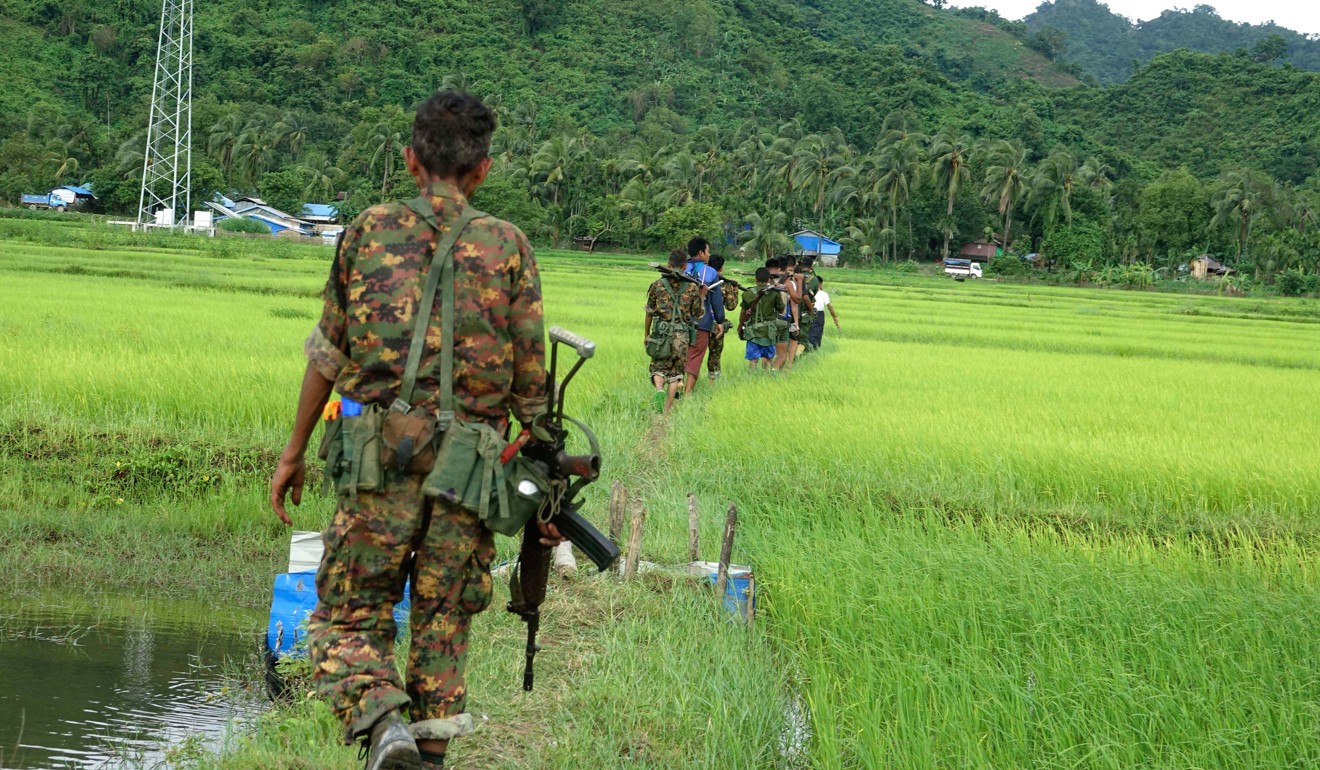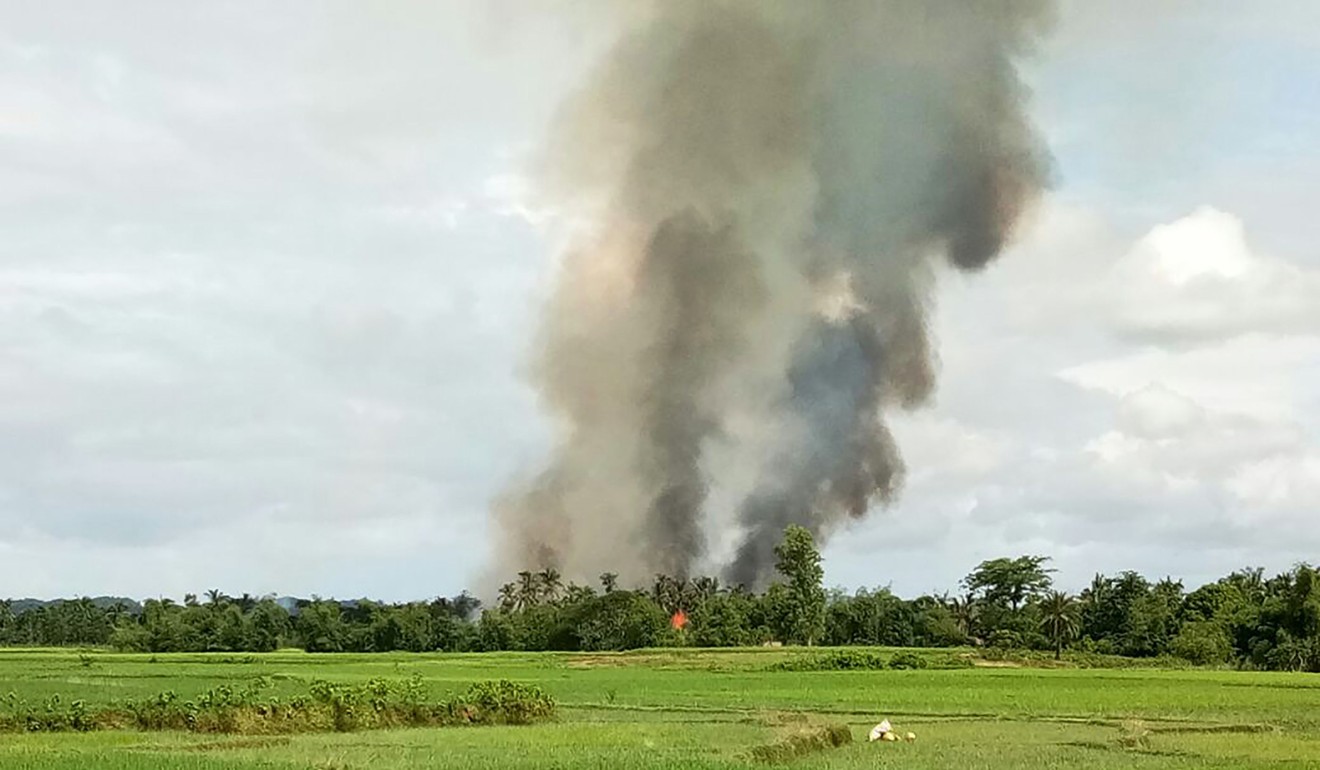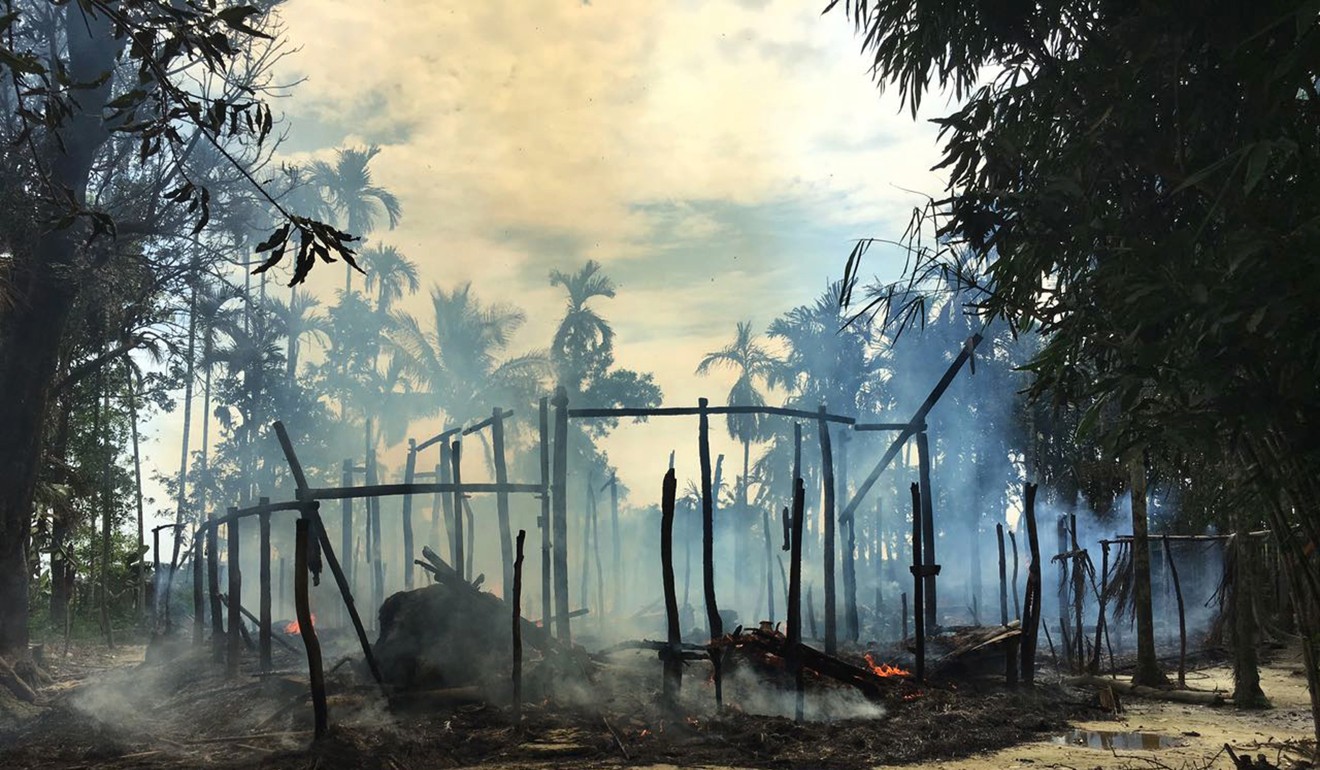
Horrific claims of Myanmar soldiers shooting Rohingya as villages burned
Myanmar said its forces were in a fight against ‘terrorists’ and have accused Rohingya militants of burning villages and killing civilians of all religions
The villagers said the soldiers came first, firing indiscriminately. Then came civilians, accompanying the soldiers, to loot and burn.
Now in Bangladesh, 20 Muslims and Hindus gave interviews in which they recounted how they were forced out of their village of Kha Maung Seik in Myanmar’s Rakhine State on August 25.
“The military brought some Rakhine Buddhists with them and torched the village,” said Kadil Hussein, 55.
“All the Muslims in our village, about 10,000, fled. Some were killed by gunshots, the rest came here. There’s not a single person left.”
Hussein is staying with hundreds of other new arrivals at the Kutapalong refugee settlement, already home to thousands of Rohingya who fled earlier.
Nearly 270,000 Rohingya have arrived in Bangladesh since August 25, when insurgents of the Arakan Rohingya Salvation Army launched attacks on security forces in Rakhine State.
Reuters interviewed villagers from Kha Maung Seik and neighbouring hamlets, who described killings and the burning of homes in the military response to the insurgent attacks.

The Guardian, in separate interviews with more than a dozen Rohingya, recounted devastating carnage as Myanmar’s armed forces swept through Tula Toli, another village on August 30 and allegedly murdered scores of people.
Those who escaped fled to the hills in the west to make the three-day trek to Myanmar’s border with Bangladesh. The rest were buried in a mass grave, villagers said.
Both Reuters and The Guardian were unable to verify their accounts. Access to the area has been restricted since October, when the same insurgent group attacked police posts, killing nine.
Myanmar said its forces were in a fight against “terrorists”.

State media has accused Rohingya militants of burning villages and killing civilians of all religions.
Myanmar does not recognise the 1.1 million Rohingya as citizens, labelling them illegal immigrants from Bangladesh.
The refugees from Kha Maung Seik, and from numerous other villages across the north of Rakhine State, said Myanmar forces and ethnic Rakhine Buddhists were intent on forcing them out.
One refugee, Body Alom, 28, said he hid in forest with thousands of others when the soldiers arrived. He waited for hours before emerging to look for his family.
He said he saw corpses in paddy fields, and eventually found his mother and brother dead with gunshot wounds. Two other villagers said they saw bodies in the fields.
“It wasn’t safe, so I just left them,” he said.
“I had no chance to give them a burial.”

Petam Ali, 30, a rice distributor recounted what happened in the village of Tula Toli on August 30.
“The soldiers used rocket-propelled grenades, and they set fire to the houses with matches. Once they had gone past, I went back,” Ali said.
“All the houses were burned. In the road, I saw a dead man I recognised called Abu Shama. He had been shot in the chest. He was 85.”
In the ruins of his house, Ali saw the singed and decapitated corpse of his grandmother.
“Her name was Rukeya Banu. She was 75. When I returned to the jungle, I described the whole incident to the rest. They burst into tears. We walked for three days.”
A military official denied that Buddhist civilians were working with authorities and instead accused Muslims of attacking other communities.

“The military arrived at the village later but did not find any bodies,” said the military source, who declined to be identified as he is not authorised to speak to media.
Another military source in the state capital, Sittwe, said Kha Maung Seik was in the conflict zone and clear information about what happened had yet to emerge.
Camps in Bangladesh which have hosted around 400,000 refugees before the latest influx are now completely overwhelmed, leaving tens of thousands of new arrivals with nowhere to shelter from the monsoon rains.
On Wednesday, Bangladesh’s foreign ministry summoned the Myanmar ambassador to demand immediate measures to curb the violence.
The Muslim Rohingya are denied citizenship in mainly Buddhist Myanmar, which is under growing international pressure over its apartheid-like treatment of the stateless minority.
On Thursday a mass funeral was held at a mosque near the border for five men whose relatives said they had been shot by the Myanmar military. The relatives carried their bodies over the border.
Myanmar said some 27,000 mainly ethnic Buddhist Rakhine have also fled in the opposite direction since August 25, accusing Rohingya militants of targeting their communities.
Myanmar’s government, led by Nobel Peace Prize laureate Aung San Suu Kyi, has rejected allegations of atrocities, accusing the international media, NGOs and the UN of fabrications.
“If the political price of your ascension to the highest office in Myanmar is your silence, the price is surely too steep,” Tutu said.
“It is incongruous for a symbol of righteousness to lead such a country; it is adding to our pain.”
Myanmar said Thursday that 6,600 Rohingya homes and 201 non-Muslim homes had been burned to the ground since August 25.
They added some 30 civilians had been killed- seven Rohingyas, seven Hindus and 16 Rakhine Buddhists – in the fighting.
Reuters, The Guardian, Agence France-Presse
